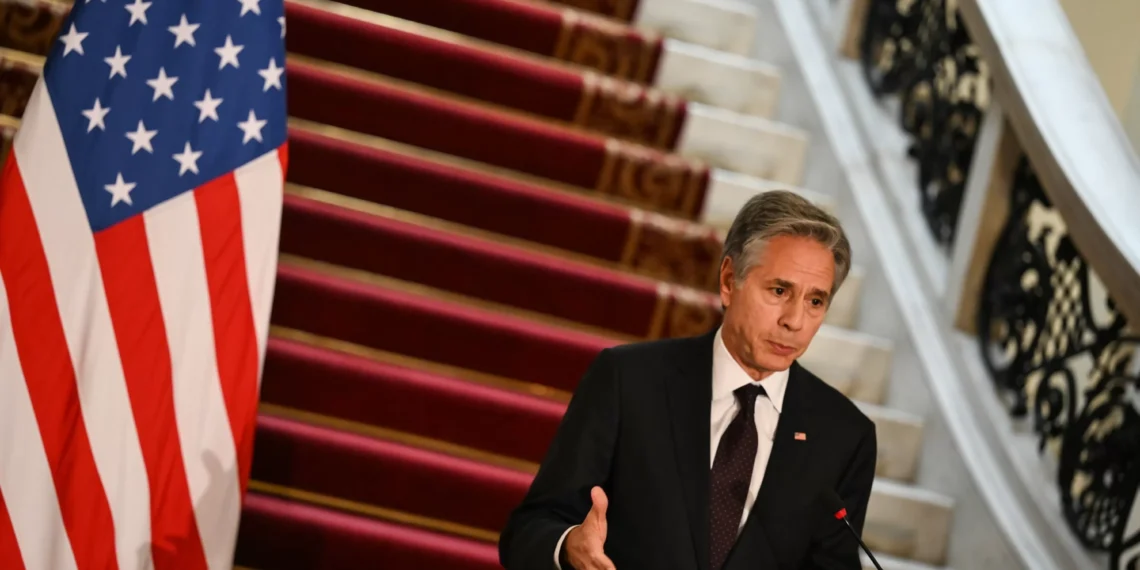In a recent visit to Cairo, U.S. Secretary of State Antony Blinken has called for a ceasefire in Israel’s ongoing war with Gaza, stating that it is the most effective way to prevent the spread of violence across the Middle East. His words come at a critical time as the conflict between Israel and Palestine continues to escalate, causing immense suffering and destruction on both sides.
Blinken’s plea for a ceasefire comes after the deadliest week of violence in the region in years, with hundreds of Palestinians killed and thousands injured in Israeli airstrikes, while Israeli civilians have also been killed by rockets fired from Gaza. The situation has sparked widespread outrage and condemnation from the international community, with calls for an immediate end to the bloodshed.
In his visit to Cairo, Blinken met with Egyptian President Abdel Fattah Al-Sisi and Foreign Minister Sameh Shoukry to discuss the ongoing crisis in the region. Egypt has played a crucial role in mediating between Israel and Hamas, the militant group that controls Gaza, and has called for a ceasefire to be implemented as soon as possible. Blinken’s visit is seen as a strong show of support for Egypt’s efforts to broker peace in the region.
During his meeting with Egyptian officials, Blinken stressed the need for an immediate ceasefire, stating that it is the best way to prevent the violence from spreading across the Middle East. He also reiterated the United States’ commitment to Israel’s security and right to defend itself, while also expressing concern for the humanitarian situation in Gaza.
The ongoing conflict has not only caused immense loss of life and destruction, but it has also had far-reaching consequences for the entire region. The violence has already spilled over into neighboring countries, with clashes between Israeli forces and Palestinian protesters in the West Bank and demonstrations in support of Palestinians taking place in Jordan, Lebanon, and other Arab countries. This highlights the urgent need for a ceasefire to prevent the situation from escalating further.
Moreover, the conflict has also strained relations between Israel and its regional allies, with several Arab countries condemning Israel’s actions and calling for a peaceful resolution to the crisis. A ceasefire would not only bring an end to the bloodshed but also pave the way for diplomatic efforts to find a lasting solution to the conflict.
The United States has been actively involved in trying to de-escalate the conflict, with President Joe Biden making several calls to Israeli Prime Minister Benjamin Netanyahu and Palestinian President Mahmoud Abbas to urge for an immediate ceasefire. Blinken’s visit to the region is a testament to the U.S.’s commitment to finding a peaceful resolution to the crisis.
In addition to calling for a ceasefire, Blinken also announced that the U.S. will be providing an additional $110 million in humanitarian assistance to Palestinians in Gaza, including food, medical supplies, and shelter. This aid will go a long way in providing much-needed relief to the people of Gaza who have been suffering from the effects of the conflict.
It is heartening to see the U.S. taking a proactive stance in resolving the crisis and showing support for the innocent civilians caught in the crossfire. The United States has long been a key player in the Middle East, and its involvement is crucial in finding a lasting solution to the conflict.
In conclusion, Antony Blinken’s call for a ceasefire in Israel’s Gaza war is a much-needed step in preventing the violence from spreading across the Middle East. It is imperative for all parties involved to heed this call and work towards finding a peaceful resolution to the crisis. The suffering of innocent civilians on both sides must come to an end, and diplomatic efforts must be prioritized to achieve lasting peace. The United States’ support for a ceasefire and its commitment to providing humanitarian aid is a positive step towards bringing an end to the current crisis and paving the way for a better future for the region.







